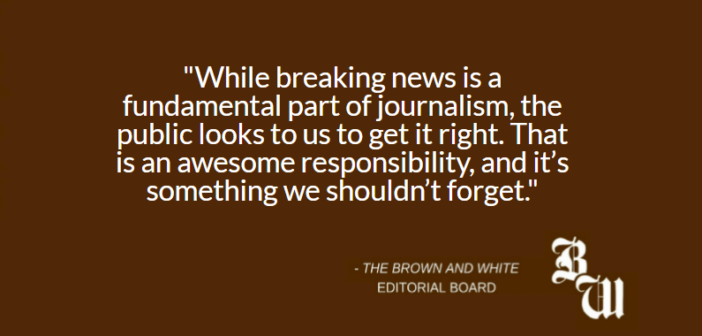For some of us, it was just a Sunday afternoon.
It was a time to catch up on homework. A time for a day in with friends. Perhaps it was a rare fleeting moment of calm, with the world seeming to finally spin slower after a busy week. That Sunday afternoon was quickly turned upside down.
Across the country, just outside Los Angeles, Kobe Bryant had died.
If only it was that simple, though. Bryant, 41, was the victim of a tragic helicopter crash that killed him, his daughter, and several other friends, spouses and coaches on board, according to the Los Angeles Times.
For a while, though, there was just one news organization out there dangling the information, should you choose to believe it. TMZ was first to break the news, and soon it became clear the reporting was largely accurate after statements from the Los Angeles County Sheriff’s Office and additional reporting by other news organizations.
It was one of those is this really real? type moments. You wanted it not to be true. Even if you didn’t know Bryant personally — the vast majority of us don’t — you didn’t want it to be true, because if it could happen to him, it could happen to us. And that’s scary.
Just like many of these tragic, dramatic events, attention soon turned to the media coverage. Questions emerged. Can we really trust TMZ?
Then, ABC’s Matt Gutman falsely reported that all four of Bryant’s children “were believed to be” killed. Social media falsely proclaimed the death of Rick Fox, a former teammate of Bryant.
Controversy arose when it was discovered that TMZ had reported the information before Bryant’s family was notified of the NBA legend’s death, while other news organizations were more cautious in their confirmation of the events.
And should news organizations have brought up a controversial 2003 accusation of rape against Bryant in their obituaries? Should hindsight always be 20/20?
There are several issues at play. First, as a student publication, we commit ourselves to accuracy above all else. As evident in the Bryant incident, there are real lives at play, and inaccurate reporting is hurtful, defamatory and inflammatory to an already grim and horrific tragedy. To write that all of Bryant’s children had died, in an effort to be first to report the story, is an inexcusable substitution of values.
Another important part of the media’s coverage is the clear emergence of the critical role of credibility. As a news organization, as with any institution of public service, including government, the courts, law enforcement, or a nonprofit, we are nothing without credibility. No matter how sound, thorough, and balanced our reporting is, we are nothing without public trust.
Journalists are sometimes the first on the scene. Journalists run toward the sound of sirens. We get as close up to that yellow tape as possible. We go places others may not dare to venture. We ask questions few others have the courage to ask.
While breaking news is a fundamental part of journalism, the public looks to us to get it right. That is an awesome responsibility, and it’s something we shouldn’t forget.
We can break the news, hold institutions accountable, and be fair and accurate. All at the same time.
And we must. With media distrust and flawed political accountability around the world, it is absolutely necessary to practice journalism with complete dedication to the truth.






Comment policy
Comments posted to The Brown and White website are reviewed by a moderator before being approved. Incendiary speech or harassing language, including comments targeted at individuals, may be deemed unacceptable and not published. Spam and other soliciting will also be declined.
The Brown and White also reserves the right to not publish entirely anonymous comments.